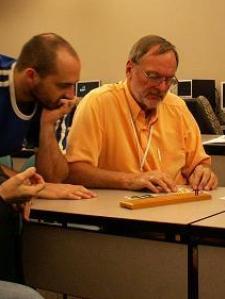
Jason B. answered • 04/26/17
Tutor
4.9
(31)
Math Specialist for All Levels
Let's write a function for number of kids, K, in terms of time in seconds, t. I'll write it then explain it.
K(t) = 3 * 2 t / 11
The 3 is the initial number of kids, so at time t = 0, K = 3. We also know that at time t = 11, the number of kids will have to be double what it was at t = 0, then double again at t = 22, etc. This is an exponential growth, which needs an exponential function. Since it's doubling each time, we use 2 as the base of the exponent. Since it only happens every 11 seconds and not every second, we divide t by 11.
Now, we need to solve the equation for K(t) = 88. Let's plug 88 in for K:
88 = 3 * 2 t / 11
88 / 3 = 2 t / 11
t / 11 = log2( 88 / 3 )
t = 11 log2( 88 / 3 )
t = 53.6 seconds
Note: log2( 88 / 3 ) is the same as log( 88 / 3 ) / log( 2 ), which can be put into a calculator


Jason B.
I agree that the number of kids is a discrete function, but I made a different assumption. I assumed that the kids got on the bus one by one throughout each of the 11 second periods (in a sort of quantized continuous exponential function), whereas you assumed that they got on as a new group every 11 seconds. I think my assumption is actually valid and does not contradict the wording of the problem, although it is a less literal interpretation. I stand by it because I also assume that this problem is likely from a math book or other resource, which is likely going to have a numeric answer. I think where the problem creators went wrong is they were trying to be creative but they didn't quite give enough specifics to clearly make it a continuous exponential function.
All that to say, I'm guessing (and I could be wrong) that the answer the creators of this problem are looking for is more likely 53.6 seconds than Technically Never, regardless of whether it's the best answer.
Report
04/27/17





Kenneth S.
04/26/17